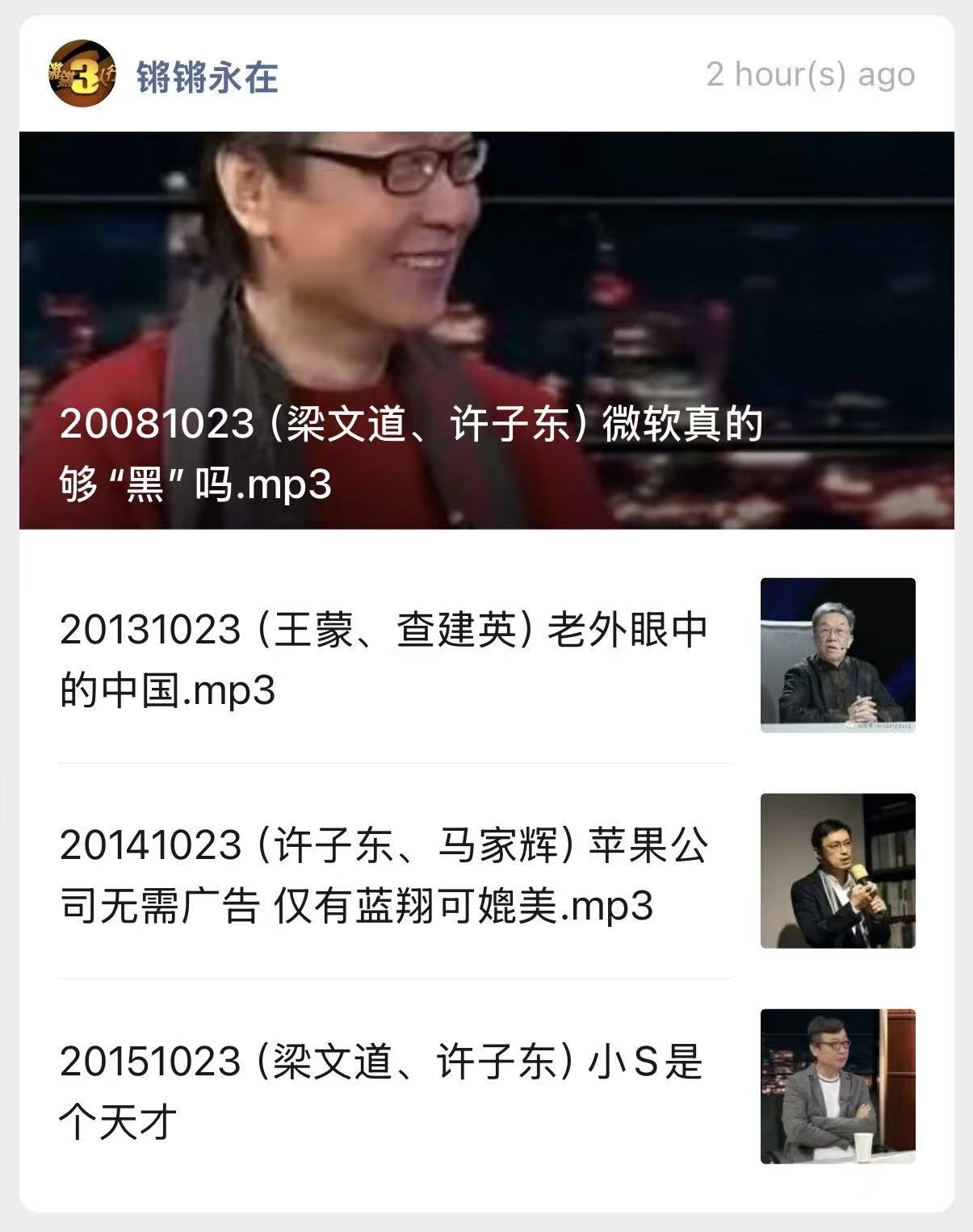读万卷书、行万里路的大人
我关注了一个发《锵锵三人行》音频的公众号,每天会更新当年这一天的锵锵。今天无意间看到历年在10/23这天更新的几期,第一反应是,锵锵真的好超前,十多年前聊的话题如今依旧能吸引我。 转过头来一想又有点悲伤,这是不是说明我这十几年其实都没什么长进呢?

2008年这期,由头是当时微软宣布所有盗版用户的电脑会每小时黑屏一次。从这条新闻开始,他们聊到了美国公司会不会窃取中国隐私、中国盗版盛行导致创新缺乏动力、 美国科技公司的倾销类似百年前的鸦片、西方专利制度的利弊、中国传统文化里对引用的态度和现代社会截然不同。
2013年,从中国人乘坐公共交通的不文明行为说起,聊到有外国人认为中国人其实是无政府主义,窦文涛问王蒙文革算不算是无政府主义的发泄。 又提到当时陈毅的儿子为文革时批斗老师道歉,个人的责任和集体的责任都不能推卸。最后拐到王蒙夸奖习仲勋。
2014年这期,主要聊的是蓝翔的广告深入人心,但其实背后存在很多乱象。
2015年这期我之前就听过,当时《康熙来了》宣布停播,窦文涛说小S是性感的肉体,蔡康永是情趣内衣。后面又引申出台湾人和大陆人说话方式上的不同。如今两档节目都已经停播多年了。
中国和美国的科技产业、国人的素质、文革历史、社会巨变中青年人的出路、娱乐圈、台湾人和大陆人。从一则即时的新闻出发,每位嘉宾都会从自己的经历出发谈天说地。 从某种意义上来说,锵锵真的是我的精神老家。如今虽然已经不太认同一些嘉宾的观点,但是依旧希望能像他们一样,变成一个读万卷书、行万里路的大人。
I follow a WeChat account that uploads audio episodes of Behind the Headlines with Wen Tao (《锵锵三人行》), posting the ones that originally aired on that day years ago. Today, I happened to scroll through the episodes for October 23rd across different years.
My first reaction was: wow, this show was so ahead of its time. Even after more than a decade, the topics they discussed still grab me. But then I had a slightly sadder thought — maybe it’s not that the show was that forward-thinking… maybe I just haven’t grown much over these years.
In 2008, the starting point was a piece of tech news: Microsoft announcing it would make pirated Windows installations turn black every hour. From there, they jumped to U.S. tech companies and Chinese privacy concerns, China’s rampant piracy and its impact on innovation, the parallel between Western tech dumping and the Opium Wars, the pros and cons of Western patent systems, and how Chinese cultural attitudes toward “citation” differ from the modern West.
In 2013, they started from public transit etiquette (or lack thereof), and segued into how some foreigners saw Chinese society as “anarchic.” Wen Tao asked Wang Meng whether the Cultural Revolution itself was a kind of anarchic outburst. They brought up how Chen Yi’s son apologized to the teacher he’d publicly denounced during the Cultural Revolution — that personal and collective responsibility can’t be entirely separated. And then somehow, they ended with Wang Meng praising Xi Zhongxun.
2014’s episode was about how the famous Lanxiang Vocational School ad became a national meme — while also hinting at the shady realities behind it.
2015’s episode I’d actually listened to before. It was the year Kangxi Lai Le announced it was ending. Wen Tao said, “Xiao S is the sensual body, and Cai Kangyong is the lingerie.” From there, they spun off into a discussion about the different ways Taiwanese and mainlanders communicate. Both Kangxi and Qiang Qiang have long ended now.
From tech monopolies to national character, the Cultural Revolution, generational anxiety, entertainment, and cross-strait differences — the show would start with a single piece of news and then branch out into wide, deeply personal conversations.
In a way, Qiang Qiang really is my spiritual home. Even though I no longer agree with some of the guests’ views, I still hope that one day, like them, I’ll become the kind of adult who’s read widely, traveled far, and has something to say about the world.